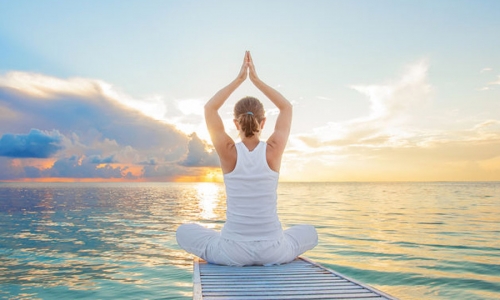I know of two individuals who participated in “Christian yoga,” and no other form of it, who ended up needing prayers of deliverance afterwards. These women were well-respected members of the community, but were overcome by the Kundalini spirit during a prayer session (to the point that it started controlling their body). Somehow their unknowing participation with the Hindu aspects of the practice had opened a spiritual door to the enemy. Because of this potential danger, I know many Christians who shun participation with any form of yoga. But this is not the experience or belief of every Christian. If yoga is wrong, why does it not affect everyone that way?
A few years ago I experienced oppression from an unknown exposure to evil. I had gone to my chiropractor for an adjustment. She was a good friend of mine, and even claimed to be a Christian. I walked into her office feeling fine, but I left feeling awful. I felt heavy and had a horrible headache – I knew something wasn’t right. I called a friend of mine who is a prayer warrior, and as she prayed for me, she heard the word “Reiki.” Neither one of us knew what this word meant so I looked it up on the Internet and found this definition, “a healing technique based on the principle that the therapist can channel energy into the patient by means of touch, to activate the natural healing processes of the patient's body and restore physical and emotional well-being.” I realized this was a New Age practice of channeling energy that did not come from the Lord, so I asked God to cleanse me of anything I had been exposed to, and my headache went away. Later, I asked my chiropractor friend about Reiki and she admitted to practicing it on me without my knowledge. Of course she had good intentions, but I still experienced the negative spiritual effects of it. In a similar manner, some believe yoga cannot be detached from its spiritual heritage, and that even if people’s intentions are pure, they can be negatively oppressed through the practice. Yet, the reality of such spiritual dangers should not lead us to fear the enemy. Instead, this should just affirm the importance of praying and seeking wisdom when making such decisions.
On the other hand, I know some Christians who feel called to bring their light into every corner of the world; they have the faith (and a clear conscience) to do yoga even in non-Christian classes. One friend in particular, who has a heart for people who are searching for spiritual truth, has led many outreaches at New Age conferences, and is quite familiar with the spiritual dangers of these practices. However, she has attended several yoga classes for the purpose of connecting with the people and sharing the love of Christ with them. My friend would ask God first if it was okay to go to the class, and if she had peace, she would pray for God’s protection and then go in faith. Even still, there were times my friend could sense the spiritual warfare around her, and she recognized there were certain yoga classes she should not attend again. So even with an evangelistic intent, the answer to whether she should participate in yoga was not always “yes” or “no,” but “it depends.”
I have another Christian friend who loved doing yoga at home with her husband and kids. However, when she learned of its deep Hindu roots, she chose not to do it anymore. This caused her husband, who didn’t share the same religious beliefs as her, to get extremely upset. He cherished this time with the children, and her decision was causing division in their relationship and household. After praying about it, she decided that as long as they didn’t do the chants, and if they prayed first, then they could do some of the poses together. My friend determined this was a way she could maintain peace in her marriage and family, without giving into the idolatrous aspects of the practice. In this situation, Titus 1:15 applied well, “Everything is pure to those whose hearts are pure.” However, she was not reckless in her decision; she was intentional about praying and waiting for God’s direction before doing anything. Though both of my Christian friends found peace in practicing some form of yoga, we must be careful not to take one person’s experience (good or bad) and make a law out of it. Instead of assuming other people’s guidelines or freedoms apply to us, we should seek God personally for direction.
The world we live in is infiltrated with non-Christian ideas and teachings. It is not possible to completely separate ourselves from these things, but even if we could, do we need to toss it all out? There are many ancient pagan practices that have been revamped into Christian traditions. For example, the Christmas traditions of decorating trees, gift-giving, and mistletoe all originated in the Babylonian feast of the Son of Isis (which was held on December 25th). Though Biblical historians agree that Jesus was not born in December, in A.D. 350, Pope Julius the First declared the celebration of Christmas on this day (most likely so the pagan Romans would more easily convert to Christianity). And then there is Easter, which was originally a celebration of the Assyrian fertility goddess Ishtar (hence the holiday tradition of eggs and rabbits). Today, most people are uninformed about the pagan history behind these holiday symbols and traditions, so they don’t carry an idolatrous connotation in our current culture. However, I wonder if Christians initially struggled to redefine these pagan celebrations, and if it caused some to stumble in their faith.
Christ clearly has the power to redeem and transform anything, but His Word also gives us guidelines regarding how to handle that which is culturally and spiritually ambiguous. So when does God want to redeem something and when are we supposed to reject or renounce it? In making this decision, I believe there are several things we should consider.
1 – We can educate ourselves regarding the things we participate in, seeking awareness of the history, intent, and possible hidden meanings present. We are told to be wise about what is good and innocent about what is evil, (Romans 16:19) but we are never told to be ignorant of evil. Hosea 4:6 states, “My people perish for lack of knowledge.” This scripture shows us that even things we are not aware of can harm us. Let’s not be those people. Understanding can be a door to wisdom, so let’s seek greater understanding. Since all truth is God’s, it is only in His light that we see the light (Psalm 36:9).
2 – We can ask God ourselves what He thinks. Some believe everything is permissible, but we know “not everything is beneficial.” (1 Corinthians 10:23) The slightest twist in something can make the difference between whether we are serving the kingdom of darkness or light. The question for us may not what is acceptable (because we have great freedom in Christ), but rather, what is God’s best? God loves to unfold His truth to us and give us good things, and He promises that if we seek Him wholeheartedly, we will find Him. If we ask Him, He will direct our path.
3 – We can examine whether our choices could cause someone else to stumble. In embracing one’s freedom to do yoga, are we possibly misleading a younger/weaker believer to engage in other forms of Hindu or New Age practices that could put them in a spiritually vulnerable place? Have we considered if our participation gives any appearance of evil to others? (1 Thessalonians 5:22) There are many ways we can take care of our bodies; yoga has not cornered the market on healthy stretches. We may want to consider if there is a different form of exercise (like Pilates, WholyFit, or Praise Moves) that could provide the same benefits without the potential risks.
4 - We can examine our motives and make sure we have a clean conscience. Do we feel a divine purpose or directive in our choice? Though we can still get things wrong with a clean conscience, God always looks at our heart. Since scripture teaches us we should do nothing without faith (Romans 14:23), it is important to wait until we have peace before moving forward. What we believe is what we empower, so if we question our freedom to do yoga, or fear the possible negative effects of participating, then we should not go because our doubt could open us up to attack.
5 – We can continually test and examine the environment we are in. We must not be naïve, but remain alert and with a sober mind, (1 Peter 5:8) careful not to let any activity lead us into experimentation with New Age or other idolatrous practices. Some things can lure us in with an appearance of being pure and good, but later adopt spiritually dangerous elements. This can be difficult since deception (by definition) occurs without us knowing. However, as David did in the Psalms, we can regularly submit ourselves to God, asking Him to examine our hearts. Since we all have blind spots, testing and proving works best in Christian community where others can help keep us accountable.
6 – We can be careful what type of meditation we practice. When we withdraw from the busyness of our day into an environment free from distraction, we are better poised to hear God’s still small voice, so it makes sense why even Christians appreciate the meditation aspect of yoga. Meditation is as important to Christianity as it is to Hinduism; we just need to be careful what we are yoking ourselves to in the process. Some yoga chants are a mixture of incomprehensible syllables that honor Hindu deities, so we need to be aware of everything we are speaking and meditating on, making sure it aligns with the Word of God. Our meditation should not aim to numb and empty our mind, but rather to renew and transform it. We should not try and disconnect our thoughts and perceptions from our self, but rather embrace our identity in Christ and allow Him to express His Spirit through our soul (not apart from it).
7 – We can recognize that just because something feels good doesn’t mean it necessarily is. There are many experiences that can lead us to euphoria: sex, drugs, money, power, New Age experiences, etc. For example, the Beatles discovered they could alter their consciousness through yoga and Hindu forms of meditation without using chemicals like LSD, which paved the way for the American embrace of Transcendental Meditation. We must always examine the source of our experience (spiritual or not) and use discernment regarding that which we accept. In his book “Latent Power of the Soul,” Watchman Nee writes, “The peril of the believer is to confuse the spirit for the soul and the soul for the spirit, and so be deceived into accepting the counterfeit of evil spirits. The greatest advantage in knowing the difference between spirit and soul is in perceiving the latent power of the soul and in understanding its falsification of the power of the Holy Spirit. Nowadays, the atmosphere is so charged with the commotion of all kinds of counterfeit that the Lord seems to be calling the church to come to a higher ground. Today’s situation is perilous. May we ‘prove all things; hold fast that which is good’” (1 Thessalonians 5:21).
Though there may be situations in which individuals have freedom and divine protection to participate in certain forms of yoga, I have personally decided to abstain from it, even the “Christian” classes. The direction of a yoga class depends highly on the instructor and their beliefs, and there is no way for me to know if there is a pure Christian focus, or a mixture of Hindu or New Age principles. For me, the risks of yoga outweigh the benefits. And since I am unable to monitor and discern what is being taught at my son's public school (and I certainly do not want him participating in a form of Hindu worship and prayer), I do not want my child participating in yoga either.
For all of you . . . “This is my prayer: that your love may abound more and more in knowledge and depth of insight, so that you may be able to discern what is best” (Philippians 1:9-10). I pray you will personally seek God for wisdom and direction, following His voice of peace in whatever path you choose, and acting on your decision only once you are “fully convinced” in your conscience. As Graham Cooke says, “If He doesn’t speak initially, He will speak eventually.” For one it may be sin, and for another there may be freedom. There are mature Christians on both ends of this debate; is it possible that they are both right?
*For those who are concerned about spiritual oppression, or other negative effects from their past involvement in yoga - THIS PRAYER may be helpful
Further Reading on this Topic:
Watchman Nee’s book “The Latent Power of the Soul”
Articles FOR Christian Yoga:
Holy Yoga by Pastor Joe Suozzo
Articles AGAINST Christian Yoga:
“WholyFit is not Christian Yoga”
Mark Driscoll “Christian Yoga – It’s a Stretch”
Ed Hird’s blog “Yoga: More than Meets the Eyes?”
Laura Bagby “Should Christians Do Yoga?"






